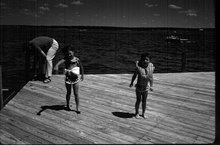
Miss Boo, 1945
It is dangerous at thirty-five to cross over into the mythical. Not that you, yourself, are, but your thoughts, from the moment you woke at three in the morning with a migraine and discovered that you could see through your closed eyelids. And now you walk as if in a dream, with fragments of elegies slipping like silvery fish in and around you. As you walk beneath the cottonwoods, a burst of dove erupts in waves from within the leaves and you know that birds are the thoughts of trees. You wonder if there are angels and how will you ever shake this feeling of passing between the sheets of the living and the dead, and how suddenly it feels as though you are lugging sloshing buckets of the emotions of the world, and how you would like to unload this burden, dump it into a river or into a field of wheat, or hurl it up into the sky to rain down on every one so that the world could taste your tears. --from S. Halley, Gravity, 2000.
I have lost the story. Some stories are too painful to tell, and though I had written this one, when it emerged it frightened me. It had begun simple enough, a scene in a family kitchen where three generations of women are arguing over the fate of a Kentucky Fried Chicken bucket that contained a history of photographs. I had an artistic concept for this story (something about which we should always be suspicious) of weaving throughout the text a history of the geology of the canyon into which the generations of my family had descended over the years, its red sandstone and whispering cottonwoods, the arrestingly cold water of the Little Red River.
Also interwoven in the story was a peculiarity that had intrigued me (perhaps repulsed me as well), a punctum as Barthes would say, of a series of photographs taken of my mother by my great grandfather. There was nothing but innocence and amusement throughout my childhood looking at these photos. But they emerged here in this story as something dark and threatening, evidence of a possibility that I had not considered but that erupted fully formed on the last page of this story I had entitled, “Lover of Stone.”
In the final scene of the story we see the youngest of the three generations, final victor over the bucket of photos, traveling down into the canyon where one by one she sets each of the images adrift on the water of the Little Red, watching the past float away in baptismal solemnity, unburdening herself of the knowledge she has inherited with the photos.
The photograph is literally the emanation of the referent. From a real body, which was there, proceed radiations which ultimately touch me, who am here; the duration of the transmission is insignificant; the photograph of the missing being, as Sontag says, will touch me like the delayed rays of a star. (Barthes, Camera Lucida)



